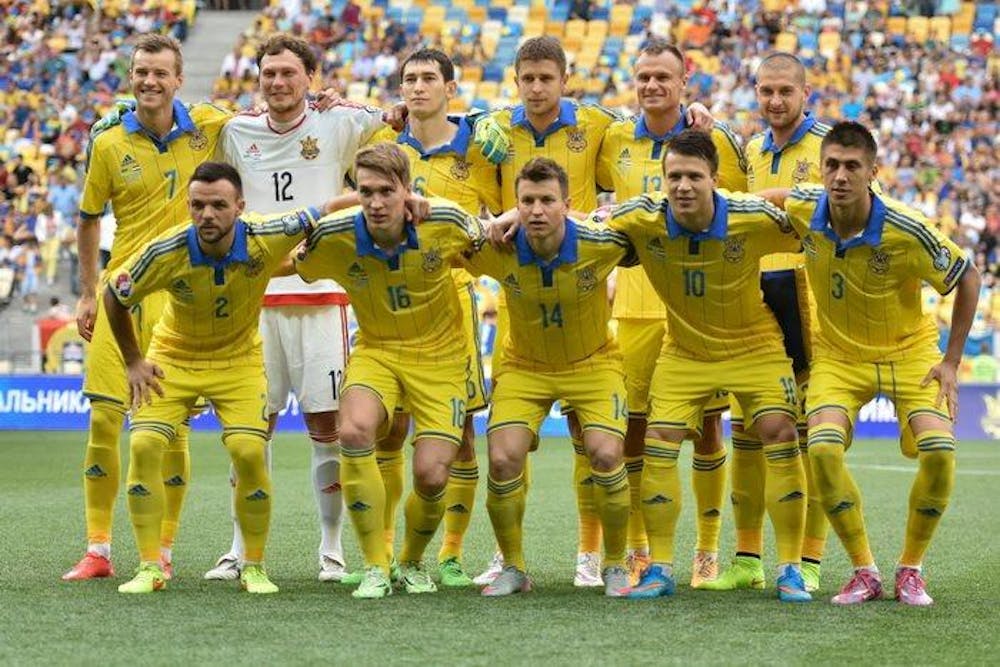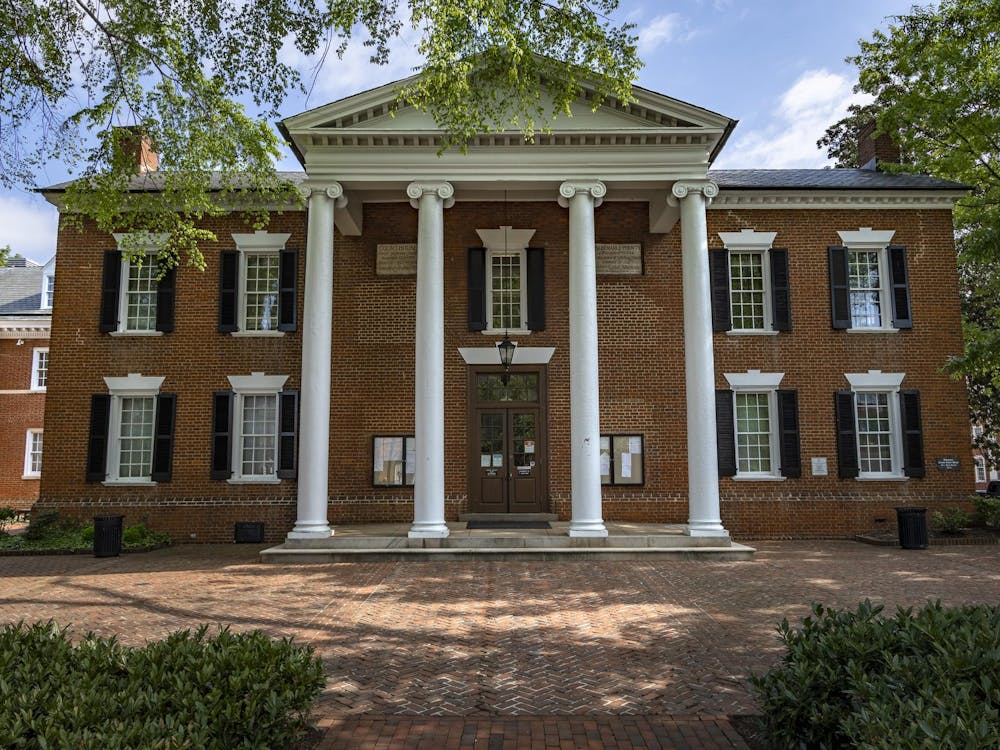Dressed in blue and purple Black History Month warmups, National Basketball Association players from the Denver Nuggets and Sacramento Kings gathered at center court before a Feb. 25 game to lock arms in solidarity with Ukraine — the last time players participated in such a demonstration was in the 2020 NBA Bubble. A day earlier, across the Atlantic, the Russian military — observing the orders of President Vladimir Putin — invaded Ukraine, reigniting a war that had been going on for over eight years.
Just as ESPN, the largest sports media company in the U.S., covered the demonstrations of athletes in the Bubble, ESPN also highlighted the Nuggets and Kings’ joint statement on their Instagram account of 22.2 million followers. From Instagram to Twitter to TikTok, many college students have digested the war in Ukraine through their social media accounts. For some, professional athletes and their social media platforms have offered the most powerful and relatable content.
Laurent Dubois, a John L. Nau III Professor in the Histories and Principles of Democracy, described the ability of well-known athletes to utilize online platforms to bring awareness to various causes.
“Popular athletes have massive social media followings and can immediately broadcast their messages,” said Dubois. “The last decade has seen a tremendous rise in athlete activism around the world, spurred on by the actions of Colin Kaepernick in the U.S., and Premier League teams continue to kneel in protest against racism at the beginning of games.”
Today, athletes across the globe are reacting to the horrible scenes taking place in Ukraine. Reactions from the world’s most popular sport — football — have been put front and center.
“There have been really remarkable and rapid responses,” said Dubois on the football world’s reactions to the war in Ukraine. “This is testament to the ways in which athletes increasingly feel it is their responsibility to speak out about broader political and social questions.”
As one of the most talented players on the Ukrainian National Football Team, fullback Oleksandr Zinchencko has used his Instagram account to both raise awareness for the war and attack Russian President Vladimir Putin, with content broadcasted to 1.6 million followers.
“My country belongs to the Ukrainians and nobody can take it over,” Zinchenko said in an Instagram post Feb. 25. “This is my country … in which I was born and raised … whose colors I represent … [and] whose border must remain intact.”
Born in 1996, in Radomyshl, Ukraine, Zinchenko, like many other Ukrainians, has feared the threat of Russian aggression his entire life. Today, however, his nation’s greatest fears have become a reality.
Kyrill Kunakhovich, a professor of history at the University and an expert on the Cold War in modern Europe, provided an analysis of the ongoing developments in Ukraine. While Putin had made advances towards Ukraine in previous history, Kunakhovich explained how the Russian president has gone further this time.
“None of [Putin’s previous forays into Ukraine] have been enough,” said Kunakhovich. “Now he is trying to remove Ukraine's democratically elected government and install a puppet regime.”
According to the UN, between Feb. 24 and March 15, there have been over 1,900 civilian casualties and over three million refugees have fled the country. In the past month, teams and players across the sports world, Ukrainian and non-Ukrainian alike, have taken to social media to both encourage Ukrainian citizens and inform young people from across the globe about the horrors of the war.
Roman Yaremchuk, forward for Portuguese club Benfica and the Ukrainian national team, was one of the first athletes to give the world notice. On Feb. 24, Yaremchuk scored a critical goal in the 79th minute of Benfica’s Champions League match and proceeded to take off his jersey, revealing a black undershirt with an emblem of the Ukrainian coat of arms.
Three days later, Feb. 28, Benfica’s 65,000 supporters greeted the Ukrainian national with a resounding roar when he subbed in during the second half of Benfica’s match against Vitoria F.C. As Yaremchuk walked to his spot on the pitch, a video — later posted to Twitter — captured the 26-year-old holding back tears as he watched a sea of fans hold up anti-war signs.
With almost 30,000 retweets and 165,000 likes, this video joined an inundation of social media content that captured the decisive reaction of the sports world to the war.
“No matter the topic … social media seems to raise the temperature,” Kunakhovich said. “[It] will bring a lot more attention to this conflict, and sports can really spread awareness – especially in countries like the U.S., where most people know little about Ukraine.”
Posted on ESPN’s Instagram account shortly after Russia’s invasion, images of world famous Ukrainian boxers Vasiliy Lomachenko and Oleksandr Usyk, decked in full combat gear, demonstrated the gravity of the war in Ukraine to the account’s largely American audience. Accustomed to seeing these fighters compete in the ring, Americans witnessed two of the world’s most renowned boxers take up arms for their country.
While the Ukrainian government recently granted Usyk permission to leave the battlefield in order to train for an upcoming bout, Lomachenko must remain in the thick of combat alongside all other Ukrainian men between ages 18 and 60. As they fight against Russia, many of their family members — wives, children, sisters and parents — have fled Ukraine, escaping to any country that will take them.
Thirty-five Brazilian footballers found themselves in the middle of this refugee crisis. Camped out in a hotel in the capital Kyiv on the afternoon of Feb. 24, players for clubs in the Ukrainian Premier League and their families appealed to the Brazilian government on their social media pages for help leaving Ukraine.
“We heard the noise of fighter jets, the noise of bombs ... It was a horrible situation,” said Shakhtar Marlon Santos, defender for Ukrainian side F.C. “But there were people that were willing to take risks, such as [a teammate], who managed to go after food, diapers for children."
In the days spent fleeing from Ukraine to Brazil, Santos posted clips on his Instagram account to keep followers updated and informed on his experience fleeing Ukraine. Unlike Santos or the other Brazilian footballers, however, Ukranians who have escaped the war do not have another home to return to.
Instead, the BBC reports that the overwhelming majority of Ukrainian refugees — over three million and counting — have made their way to Poland, Ukraine’s neighbor to the west. As his nation opened its arms to these Ukrainian refugees, Poland’s most decorated athlete, footballer Robert Lewandowski, made a statement on his Instagram account declaring his solidarity with Ukraine.
“As an athlete, I can’t pretend nothing is happening,” Lewandowski said to his 24.5 million Instagram followers Feb. 26.
To put Lewandowski’s influence into perspective, LeBron James is the only American athlete that has more Instagram followers than the Polish star forward. Thus, Lewandowski’s willingness to speak out on the war has reverberated throughout the football world. Besides empowering his followers, his message, along with those of other athletes, has forced the hand of football’s power brokers — organizations that have the capability to sway international politics.
The same day of Lewandowski’s Instagram post, the Polish National Football team announced their refusal to play Russia in their upcoming World Cup qualifying match. Two days later, the International Federation of Association Football indefinitely banned Russia from the World Cup and UEFA indefinitely banned Russian clubs from competing in any European competitions.
According to Dubois, FIFA has not taken such a stand against a country since the organization banned South Africa from participating in any international tournament in 1957 because of worldwide backlash against its apartheid system. The Russian economy, however, is much more intertwined with the football world today than South Africa's was in the 1950s.
“Putin has gotten a tremendous political boost globally from hosting international sporting events, particularly the 2018 World Cup,” Dubois said. “So sporting institutions have been complicit in the way [Putin’s] regime has positioned itself on the world stage. Russian money, most obviously Roman Abramovich’s ownership of Chelsea, [also] plays a massive role in the current global football economy.”
As countries throughout the world instituted crippling economic sanctions on Russia in recent weeks, individual football clubs too have taken steps to disassociate themselves with Russian state-affiliated companies. Additionally, under immense social pressure from fans and media alike, Roman Abramovich, Russian oligarch and owner of Chelsea F.C., announced March 1 that he will sell the $3.1 billion-valued club. Perennially a top side in the English Premier League, according to forbes, Chelsea is the 25th most valued sports team in the world.
“Politics is very much about stories and symbolism,” Dubois said. “Obviously, football on its own can’t dramatically change the political context, [but] through athlete’s actions, those of federations and confederations, and those of private clubs, the world of [football] will undoubtedly … have an important role in shaping how [the war] ultimately plays out.”
Regardless of the actual effect that the sports world will have on the outcome of the war, it is clear that people are more aware of the conflict in Ukraine due to the social media presence of athletes, clubs and sports media companies. From Cristiano Ronaldo to Lebron James, athletes have the power to effect change in millions of people, the question, however, is what they will choose to speak up on.







